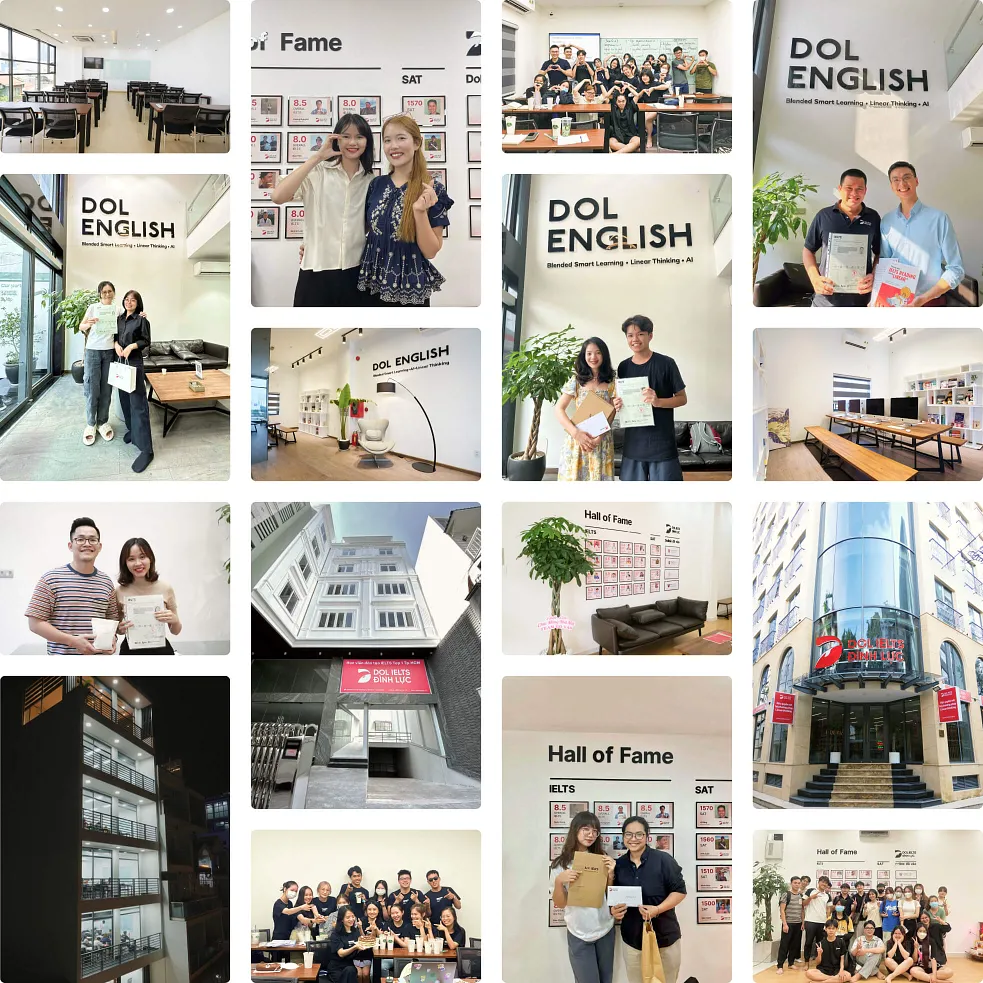Tổng quan cấu trúc đề thi IELTS Speaking Part 1
IELTS Speaking Part 1 được xem là phần giúp thí sinh “gây ấn tượng đầu tiên" với giám khảo. Vậy đâu là chiến thuật trả lời dạng câu hỏi này tốt nhất? Bài viết dưới đây sẽ hướng dẫn học viên cách sử dụng tư duy Linearthinking để trả lời và phát triển câu hỏi Part 1, cũng như cung cấp sample mẫu và kho đề khổng lồ để học viên luyện tập.
DOL IELTS Đình Lực
Oct 25, 2022
2 mins read

Table of content
Phương pháp
Cách bắt đầu câu trả lời cho Part 1
Cách phát triển câu trả lời cho Part 1
Bài mẫu
Do you enjoy reading? Why?
What sort of things do you read?
When do you usually read books?
What are the advantages of reading instead of watching television or going to the cinema?
Tổng hợp đề bài
Phương pháp
Cách bắt đầu câu trả lời cho Part 1
Với IELTS Speaking Part 1, tuỳ vào loại câu hỏi mà có những cách bắt đầu câu trả lời khác nhau:
Câu hỏi dạng Yes - No
Thay vì đơn thuần trả lời câu hỏi này bằng “Yes I do" hay “No I don't" thì thí sinh hoàn toàn có thể sử dụng những cấu trúc câu sau đây để trả lời một cách tự nhiên và đa dạng hơn
YES | NO |
|
|
Example:
Do you enjoy living in the city?
=> Without a doubt! …. hoặc I'd have to say no.
Câu hỏi Wh-
Với những câu hỏi bắt đầu bằng Wh- hay How, thay vì đi thẳng vào câu trả lời ngay từ đầu, thí sinh có thể làm đa dạng cấu trúc câu trúc câu trả lời của mình bằng cách thêm vào vế sau:
To be honest…
I'd have to say that….
Actually,...
Well to be fair…
Example:
How often do you consume fast food?
=> To be honest, I eat it almost everyday….
Câu hỏi hỏi sở thích
Để trả lời câu hỏi hỏi về sở thích, thí sinh có thể dùng những cấu trúc sau để bắt đầu:
My favourite…. would be….
I have many …. I like but if I have to choose one, then it’ll be….
I'm really fond of….
I'm a big fan of…
I absolutely adore…
Example:
What is your favourite music genre?
=> Well to be fair I have many genres that I like but if I have to choose one it'll be pop…
Cách phát triển câu trả lời cho Part 1
Part 1 thường yêu cầu thí sinh phải trả lời tầm 3 câu cho mỗi câu hỏi. Vậy làm sao để thí sinh dễ dàng phát triển ý?
=> Áp dụng Linearthinking nhé!
Với Linearthinking, thí sinh có thể sử dụng những công cụ sau để mở rộng câu trả lời của mình:
Give a reason (Đưa ra lý do): This is because…./ The reason for this is that...
Give an example (Đưa ra ví dụ): For example,.../ Let me give you an example...
Give an explanation (Đưa ra lời giải thích): Let me explain/ To be more specific,.../ What I mean is.../ What I'm trying to say is...
Give your feeling (Đưa ra cảm nhận): I find it…. / I feel...
Example:
What is your favourite music genre?
=> Well to be fair I have many genres that I like but if I have to choose one it'll be pop. [Reason] The reason for this is that pop is so easy to listen to and it can help cheer me up whenever I feel down. [Example] Let me give you an example. Last night I was really blue because my girlfriend left me but after listening to some Justin Bieber I felt much better!
How often do you consume fast food?
=> I eat it almost everyday. [Explanation] To be more specific, I probably eat it around a few times a day. [Opinion] I find it extremely tasty and almost impossible to resist!
Cùng tìm hiểu thêm về cách sử dụng Linearthinking để phát triển ý trong Speaking tại đây #Link 7 Linearthinking in Speaking
Tham khảo khóa học IELTS để đạt mục tiêu IELTS Speaking 6.0+ trong 8 tuần tại đây
Bài mẫu
Cùng tham khảo thử một bài mẫu trong IELTS Speaking Part 1, chủ đề Reading nhé!
Do you enjoy reading? Why?
=> I'm not a huge fan of books, to be frank. I think reading books is pretty boring: they are full of words and there is little to no visual stimulation. As a result, it is quite difficult for me to concentrate when I read books!
What sort of things do you read?
I have quite a diverse taste. I like reading fictional books since they help me escape my boring day-to-day life. When I read these stories I can immerse myself in a new virtual world with fictional characters and storylines. I find it really interesting!
When do you usually read books?
I usually read books when I'm on public transport, like when I'm taking a bus to work. It's very easy for me to get bored so I spice my trip up by reading books to pass the time. I also read books before my bedtime because it's easier for me to fall soundly asleep afterwards.
What are the advantages of reading instead of watching television or going to the cinema?
=> There are plenty of benefits that reading can have over watching TV or going to see a movie. The first one I can think of is how I can expand my vocabulary when I read books. I can't do that when I watch TV since I can use visual cues to guess what is going on, but when I read books I have no other choice but to look up and learn all the words that I don't know.
Tổng hợp đề bài
Theo dõi thêm nhiều câu hỏi IELTS Speaking Part 1 tại đây #Link 108 Chủ đề & câu hỏi part 1
Vậy là qua bài viết trên, thí sinh đã phần nào hiểu được cách tiếp cận tốt nhất để bắt đầu và mở rộng câu trả lời trong Part 1. Đừng quên khám phá thêm những bài viết khác trong chuyên mục Speaking của DOL để cùng chinh phục thật tốt bài thi IELTS Speaking nhé!
Table of content
Phương pháp
Cách bắt đầu câu trả lời cho Part 1
Cách phát triển câu trả lời cho Part 1
Bài mẫu
Do you enjoy reading? Why?
What sort of things do you read?
When do you usually read books?
What are the advantages of reading instead of watching television or going to the cinema?
Tổng hợp đề bài

